Fans say football regulator needs to be effective
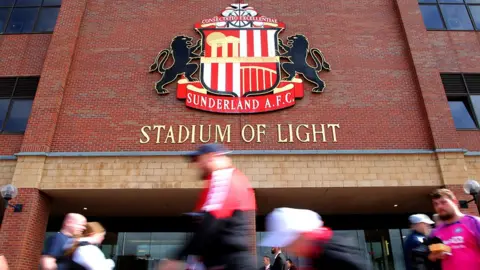 PA Media
PA MediaFootball fans and experts across the North East of England and Cumbria say they broadly support the idea of an independent regulator for the national game, as long as it would be effective.
The Football Governance Bill is currently making its way through the House of Lords and will then be debated by MPs in the Commons.
The government says the new law would protect clubs, fans and the future of the game.
But the Premier League is concerned regulation could have a negative impact on financial competitiveness and investment.
Most football clubs in the region have had experience of contentious owners, financial woes and controversy.
Darlington's is arguably one of English football's greatest disasters.
George Reynolds - later to be convicted of tax evasion - bought the club in 1999 and built a 25,000 seater stadium, which he named after himself.
It left the Quakers in financial ruin, forced into administration and thrown out of the league.
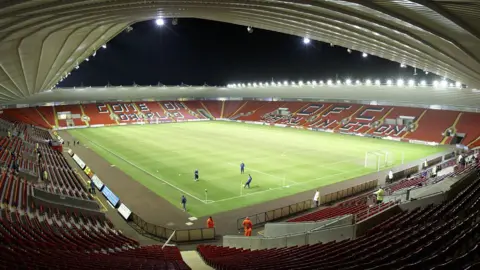 Getty Images
Getty ImagesThe club is now owned by fans. A network of about 1,200 members pay the players' wages every month from their own pockets.
Darlington FC chief executive David Johnston said clubs get into financial difficulty because "people will go chasing a dream".
"The lure of the Premier League, the riches that come from the Premier League," he says.
"You need the right control and discipline as you would any business. A football club is no different."
It is hoped a new regulator would ensure Darlington's experience is assigned to history.

Independent regulation should also mean football clubs cannot raise ticket prices, move stadiums, or change colours or logo without consulting fans first.
They would be also be required to publish what action they were taking to improve equality, diversity and inclusion - a move that is welcomed by Prof Stacey Pope of Durham University.
"Football clubs still have a very long way to go," she says.
"In fact you could say that many of them still operate in the dark ages."
Men's football has a "significant" problem with sexism and misogyny, Prof Pope believes.
"We know every week at men's football matches women are experiencing gendered violence and abuse," she says.

Fans are generally supportive of the plan for regulation, but they still have questions.
Sunderland AFC supporter Mike Clark from Whitley Bay says: "With the fit and proper owners test - who makes the decision on who is fit and proper?
"Who decides who has integrity and who doesn't?"
Another Sunderland fan, Ian Smith from Gateshead, believes football is now a business, not a sport.
"We've got to have some level of control," he says.
"Otherwise the richest clubs would get all the best players and the rest would suffer."
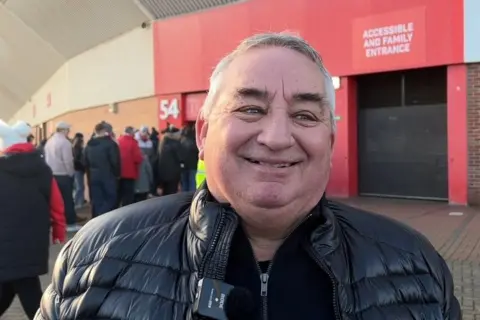
One of the biggest challenges facing a new regulator is how to address the huge financial divide between the Premier League and the rest of the football pyramid.
In 2007 "parachute payments" were introduced – money given annually to clubs relegated from the top flight to help them cover player wages when they drop to the championship.
The Premier League gives each relegated club £45m in the first year out of the top flight. That is more than it gives to the other 116 clubs in league one, league two and the national league.
Money from media rights is also a big issue. Every year the Premier League gets billions from broadcasters and it controls how that money is shared out among the rest of the pyramid.
'Chasm' between leagues
The Premier League says it is concerned a regulator would have "unprecedented and untested powers to intervene in the distribution of revenues" and that this could have "a negative impact" on competitiveness and investment.
Chief policy and social impact officer Clare Sumner said: "While the government champions growth across the economy, this legislation threatens to achieve the opposite.
"No-one wants the regulator to be causing and then managing the decline of one our greatest and most visible industries - but we genuinely believe that is the risk we run, if we inadvertently get this regulation wrong."
But the English Football League (EFL) has come out in support of regulation, keen to see a fairer distribution of money through the pyramid.
EFL chairman Rick Parry believes there is a "chasm" between the Premier League and the EFL.
"The gap was £11m in 1993 – it's now £3bn," he says.
"That is enormous and it's getting harder and harder for clubs going up and then coming straight back down again.
"There's too much financial jeopardy. You can't have clubs facing catastrophe either when they're relegated or when they're promoted."
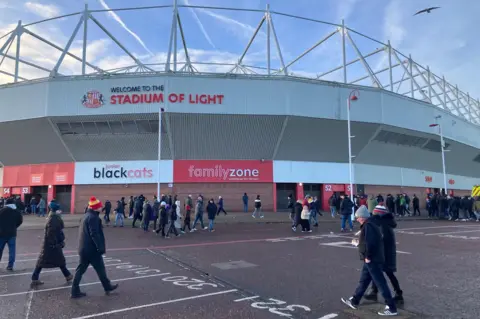
Looking at football clubs purely as businesses some ask why they should be subject to regulation.
Assistant professor at Northumbria University's business school, Dr Mark Middling, says they bring "so much meaning" to many members of the community.
"If the hotel across the road goes bust you're not going to get a hoard of previous guests of that hotel trying to raise a phoenix hotel," he says.
"If a club goes down, fans will rally.
"That's the level of passion that separates football clubs from other businesses."

Newcastle United, Sunderland AFC and Middlesbrough FC declined to give their views on the football governance bill at this stage.
League two club Carlisle United says an independent regulator was something they would welcome.
Chief executive Nigel Clibbens says football plays a "very special part in the fabric of society" and was "right at the heart of the community" in many places.
"That needs protecting and nurturing," he says.
"We've been fortunate at Carlisle that our ownership's been good but there's been other clubs where their ownership has let them down.
"This is about protecting clubs, not just now but for the long term."
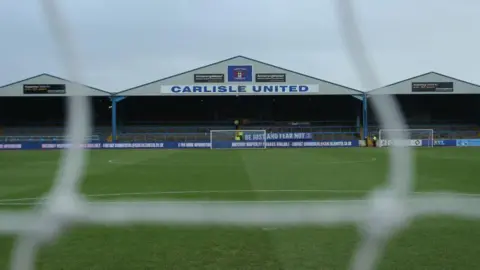 Getty Images
Getty ImagesThe Department for Culture, Media and Sport says the law will "put fans back at the heart of the game, take on rogue owners, and crucially help to put clubs on a sound financial footing".
The government hopes it will come into force later this year.
Follow BBC North East on X and Facebook and BBC Cumbria on X and Facebook and both on Nextdoor and Instagram. Send your story ideas to [email protected].
